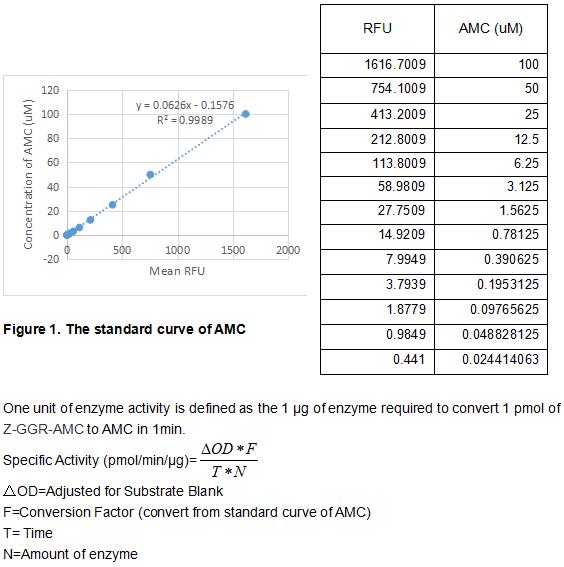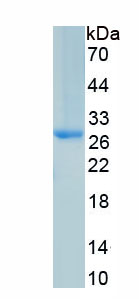Active Plasminogen Activator, Urokinase (uPA) 

PLAU; ATF; URK; UK; UP-A; Abbokinase; Urokinase-Type Plasminogen Activator
- UOM
- FOB US$ 201.00 US$ 502.00 US$ 1,004.00 US$ 3,012.00 US$ 7,530.00
- Quantity
Overview
Properties
- Product No.APA140Mu62
- Organism SpeciesMus musculus (Mouse) Same name, Different species.
- ApplicationsCell culture; Activity Assays.
Research use only - DownloadInstruction Manual
- CategoryTumor immunity
- Buffer FormulationPBS, pH7.4, containing 5% Trehalose.
- Traits Freeze-dried powder, Purity > 95%
- Isoelectric Point8.5
Sign into your account
Share a new citation as an author
Upload your experimental result
Review

Contact us
Please fill in the blank.
Activity test

Urokinase Plasminogen Activator (uPA), also known as u-plasminogen activator or urokinase, is a highly-specific serine protease from the peptidase S1 family that cleaves plasminogen to form plasmin making it a key player in the plasminogen activator (PA) system. Expression of uPA is minimal in normal cells but is increased several fold in tumor cells by extracellular stimuli elevated in cancer and corresponds to poor outcomes in several types of cancer. Therefore, uPA has been identified as an excellent target for therapeutic development through inhibition of protease activity or though inhibition of uPA-dependent signaling while in complex with uPA receptor (uPAR). The activity assay of uPA was measured by its ability to cleave a peptide substrate, N-carbobenzyloxy-Gly-Gly-Arg-7-amido-4-methylcoumarin (Z-GGR-AMC). The reaction was performed in 50 mM Tris, 0.01% Tween-20, pH 8.5 ( Assay Buffer), ainitiated by addition 50 μL of 1.5 ug/ml uPA (diluted by Assay Buffer) to 50 µL of 200 uM Substrate. Read at excitation and emission wavelengths of 380 nm and 460 nm (top read), respectively, in kinetic mode for 5 minutes. The specific activity of recombinant mouse uPA is >700 pmol/min/µg.
Usage
Reconstitute in 10mM PBS (pH7.4) to a concentration of 0.1-1.0 mg/mL. Do not vortex.
Storage
Avoid repeated freeze/thaw cycles. Store at 2-8°C for one month. Aliquot and store at -80°C for 12 months.
Stability
The thermal stability is described by the loss rate. The loss rate was determined by accelerated thermal degradation test, that is, incubate the protein at 37°C for 48h, and no obvious degradation and precipitation were observed. The loss rate is less than 5% within the expiration date under appropriate storage condition.
Increment services
-
 BCA Protein Quantification Kit
BCA Protein Quantification Kit
-
 Molecular Mass Marker for Protein
Molecular Mass Marker for Protein
-
 Monoclonal Antibody Customized Service
Monoclonal Antibody Customized Service
-
 Polyclonal Antibody Customized Service
Polyclonal Antibody Customized Service
-
 Protein Activity Test Experiment Service
Protein Activity Test Experiment Service
-
 Electrophoretic Mobility Shift Assay (EMSA) Experiment Service
Electrophoretic Mobility Shift Assay (EMSA) Experiment Service
-
 Buffer
Buffer
-
 Lentivirus Packaging Experiment Service
Lentivirus Packaging Experiment Service
-
 Adenovirus Packaging Experiment Service
Adenovirus Packaging Experiment Service
-
 Real Time PCR Experimental Service
Real Time PCR Experimental Service
-
 Spike RBD Protein (S-RBD)
Spike RBD Protein (S-RBD)
-
 Protein G
Protein G
-
 Protein A
Protein A
Citations
- Oral administration of benzyl-isothiocyanate inhibits solid tumor growth and lung metastasis of 4T1 murine mammary carcinoma cells in BALB/c miceSpringerLink: f3w831267267p277
- Decreased Hepatocyte Growth Factor (HGF) and Gamma Aminobutyric Acid (GABA) in Individuals with Obsessive-Compulsive Disorder (OCD)PubMed: PMC3762604
- Downregulation of MACC1 inhibits invasion, migration and proliferation, attenuates cisplatin resistance and induces apoptosis in tongue squamous cell carcinomaPubmed:25421538
- 1, 25-Dihydroxyvitamin D3 alleviates salivary adenoid cystic carcinoma progression by suppressing GPX1 expression through the NF-κB pathwayPubmed:26782341
- Methylation of neurofilament light polypeptide promoter is associated with cell invasion and metastasis in NSCLCPubmed:26801564
- Cytokine and Estrogen Stimulation of Endothelial Cells Augments Activation of the Surface-Bound Prekallikrein-High Molecular Weight Kininogen Complex: Implications for Hereditary Angioedema (HAE): 814article:S0091-6749(15)02643-3
- A Study Protocol: Spinal Morphology, Physical Performance, Quality of Life and Biochemical Markers in Adults at Risk of Osteoporotic Fractures 59f7c85aaca272607e2d8d7a
- Urokinase plasminogen activator secreted by cancer-associated fibroblasts induces tumor progression via PI3K/AKT and ERK signaling in esophageal squamous cell carcinomapubmed:28404945
- Cytokine and estrogen stimulation of endothelial cells augments activation of the prekallikrein-high molecular weight kininogen complex: Implications for hereditary angioedema.pubmed:27826093
- Effect of a synthetic inhibitor of urokinase plasminogen activator on the migration and invasion of human cervical cancer cells in vitroPubmed:29328476
- Multi-omics analysis reveals the mechanisms of action and therapeutic regimens of traditional Chinese medicine, Bufei Jianpi granules: Implication for COPD drug …Pubmed:35121390
- IL4 stimulated macrophages promote axon regeneration after peripheral nerve injury by secreting uPA to stimulate uPAR upregulated in injured axonsPubmed:35536429







